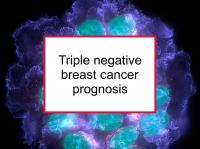A new study has reported that triple negative breast cancer with tumor size less than or equal to 1 cm has worse prognosis than similar-sized hormone receptor positive breast cancer. Triple negative is a subtype of breast cancer that is estrogen receptor negative (ER-), progesterone receptor negative (PR-), and HER2 negative.
The study included 377 patients with primary operable breast cancer with tumor size 1 cm or smaller who were enrolled from 1995 to 2006 at two Taiwanese hospitals. Triple negative tumors were compared to tumors with any positive receptors (non-triple negative disease, including ER+/PR+, ER-/PR+, or ER+/PR- combined with either HER2+ or HER2-) with respect to disease-free survival and breast cancer-specific survival.
Study results
Triple negative breast cancer patients (including the subset with positive axillary lymph nodes) were not found to have poorer five-year disease-free survival or breast cancer-specific survival than non-triple negative breast cancer patients overall. However, in lymph node-negative patients, triple negative disease was associated with poorer five-year breast cancer-specific survival.
When compared only to the subset of patients with hormone receptor-positive (ER+/PR+) and HER2-negative disease, triple negative patients had poorer disease-free survival and breast cancer-specific survival. Positive lymph nodes were associated with recurrence and breast cancer-specific death.
The authors conclude that triple negative breast cancer is very likely an independent prognostic factor in small node-negative invasive breast cancer.
Please see our article on triple negative prognosis for more information on triple negative disease.
